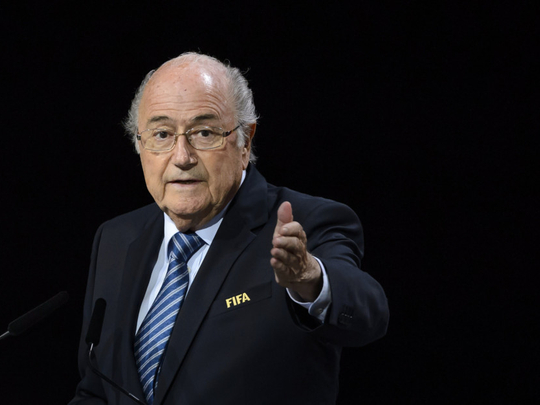
Say what you like about Sepp Blatter, the man has chutzpah. This evening he will be running for a fifth term as Fifa’s president, on a ticket that he is the man to lead the organisation out of the cesspit of corruption he has presided over.
His challenger, Prince Ali of Jordan, may yet defeat him, but given Blatter’s entrenched African, Oceanic and Latin American support and his extraordinary record of political escapology it is still hard to bet against him. In which case what are we do with a Blatter-run Fifa?
Gary Lineker has wondered whether we just need “to start again”; others have called for national sides to boycott its tournaments or for Uefa to walk away; almost everyone is hoping Fifa’s sponsors will withdraw their support. All these courses of action have their merits, but all have serious flaws too.
First, however bad Fifa’s record is, critics need to ask whether they think the global game should have a global body. Part of the reason this affair is so appalling is that Fifa, indeed the entire football industry, has traded on the notion that the game really is the most global cultural practice in the world, a rare form of universalism on a divided planet. That, if nothing else, is worth salvaging from the wreckage.
It’s also worth reminding ourselves how hard it is to create durable, functioning global institutions. None of the calls to abandon Fifa and start again have been accompanied by a clear sense of an alternative. Nor does any thought seem to have been given to the fact that, in the absence of regulation, commercial interests are likely to become more influential than ever.
Calls to boycott Fifa and the World Cup should not be the reflex option. Why go to the brink immediately? Boycotts of big sporting events have their place in the toolbox of protest, but now is not the moment to threaten them. As importantly, has anyone asked the players, officials and clubs who would be affected by a boycott what they think?
Uefa is the leading voice for reform within football and has thrown its weight behind Prince Ali in the presidential election. Whatever the outcome of the contest, it is important that the transformation of Fifa is not just a European operation but becomes a truly global conversation. There are plenty of reformist forces outside Europe, though this rarely includes those in positions of official power, and they must be part of the process. What is good for large and rich football nations is not necessarily good for all. Fifa, for all its faults, has sought to transfer some of the wealth of football in the rich world. Quite where the money then goes is another matter.
The shift in position of a number of Fifa’s corporate partners, most notably Visa, is to be welcomed. Sponsors, though, are pretty compromised agents of governance reform, given what they have managed to overlook in the past, and in any case they account for less than a third of Fifa’s income. The vast majority of that income comes from broadcasters, and they have been completely silent so far. Pressure from the world’s television networks, especially as they have all paid up in advance for World Cup media rights, would be equally powerful, if not more so. In any case, these companies need to do more than issue stern words. They should make specific demands, the first being that Blatter resigns.
If Blatter emerges victorious, all stakeholders will need to be mobilised. But alongside football associations, sponsors and broadcasters, we will need to hear from other voices: players, officials and their representatives; the world’s leading leagues and clubs; and, most importantly, football fans and their innumerable organisations, both official and unofficial.
A call has gone out in Brazil for a minute’s noise at games to protest. It would be a good exercise to build on. Fans attending next month’s women’s World Cup in Canada might also like to think about what fun they could get up to. Other forms of direct action might prove popular. And we will all be waiting to see what additional contribution to the process will come from the US and Swiss attorney generals’ offices.
If, by some miracle, Prince Ali and his close ally, Uefa president Michel Platini, emerge as winners, the game will not be over. Fifa will still be composed of 209 unaccountable football associations; its voting and financial structures will remain an invitation to the politics of patronage; its culture, like that of the rest of the football world, will remain self-regarding. Breaking through the carapace of indifference and contempt that has passed for football governance at Fifa required action from outside football’s ruling order. If Blatter hangs on, deposing him will require the efforts of outside agencies; the herculean task of cleaning up Fifa will be no different.
Guardian







